Even the smallest sole trader with the tiniest client list needs to have some policies to help them navigate the world of business. It becomes very clear early on that when we deal with the public, some form of rules are needed so that those who work in the service environment aren’t taken advantage of. Everyone can forget the odd appointment, and sometimes, life in general means that a client can be late, but persistent no shows, lates or late cancellations can affect a business, no matter how small it is.
The policies below are simply a guild to what to think about when you are setting out your own salon policies. The list is not exhaustive, and you may decide not to implement others. Every salon requirement is on a need basis.
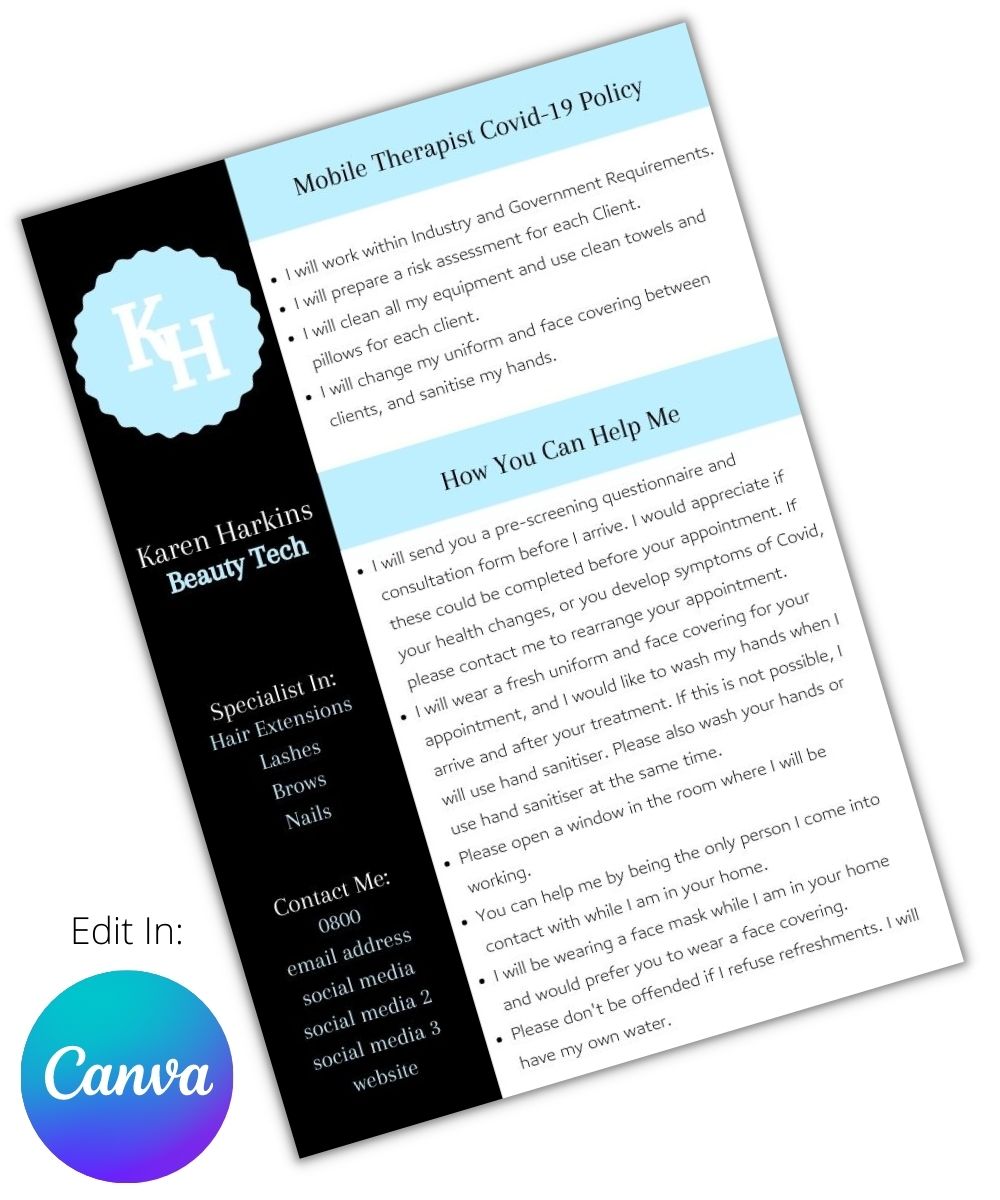
What are salon policies?
These are a list of your rules. They set out your limits and the procedures you will take for your clients and how they behave towards your business.
These rules help you to organise your work schedules, appointments and calendar, allowing you to work fairly to all your clients and any staff that you employ. If you are self employed, these allow you to help manage your own working environment.
Spend time to reflect on what you will have as part of your salon policies, and how they will affect your business. Policies for mobile working self employed service workers will be different from those who work in a salon, or those who work from home. When you write your policies, make them easy to find, and display some of them on your wall, or on your website, to help your clients and staff maintain safety at work. Make sure your policies are achievable, ie they are realistic and can be followed.
Businesses must tailor their policies to their own needs. What is right for one business will not necessarily be right for another. If you need to, write risk assessments around each aspect of your business and create your policies from those.
Types of Salon Policies
The biggest issue most service industries face as the late arrivals and cancellations. It makes sense to draft and wrote policies that help you manage these situations. There are also different ways of dealing with issues that might come up in relation to how they are worded.
- We’ve drafted some policies here, and helped with some templates to help navigate these.
- These are simply templates and suggestions, and are not legally enforceable or guaranteed to stand up in court.
- You are required to change any text and wording to suit your own needs.
- We are not liable for your end use of these posts, contents or products.
- You MUST tailor them to your business to ensure you are legally compliant.
- Purchase and use of any of our templates, requires you to accept all responsibility for their use, under any circumstances.
- If you are imposing fines for any of your policies, make sure all your clients know about these in advance. If you change your policies to new ones or change the terms of these policies, also ensure your clients are aware of the new policies you have in place.
Late Arrivals, Cancellations and No Shows
Late Arrivals
Dial down the time you are willing to to wait for a client who is late. You might decide 5 minutes, 15 minutes or 30 minutes is acceptable. If you work client to client with a short interval in-between, you might find 5 minutes is the longest you can wait for a client to arrive. If you work from home, or on your own and have a long lead time between clients, you might decide to give them 15 or 30 minutes. The time you are waiting for a client to arrive, is time you are losing money. Also think about the time you are willing to make you next client wait, if you have someone arriving soon after.
An example statement might include respectfully asking clients to arrive on time for their appointment and outlining arrivals of more than £15 minutes late will result in a cancelled or rescheduled appointment, and a late arrival fee.
Late Cancellations
Late cancellations leaves you with spaces that you cannot fill at short notice and results in reduced earnings for the day. While most businesses can absorb a certain level of late cancellations, it’s reasonable to set out your cancellation policy in advance. If an appointment has been booked for many days/weeks in advance, and is cancelled at short notice, your policy might be different from someone who booked in a last minute slot and cancelled an hour later. Try to work those situations differently where possible.
Think about the time between appointment and cancellation. If you have a 24 hour or 48 hour cancellation policy, it allows clients to cancel close to the appointment time, without charging them. We all understand that life sometimes happens, and our clients have emergencies that require them to reschedule or cancel quite close to the appointment.
In your wording, set out your cancellation policy, ie 24 or 48 hour policy. Also set out your fees chargeable for not cancelling within those timeframes. If it is a same day booking, request notification as close to the appointment as possible. If you set out a cancellation fee, consider how you will collect that. Some businesses will decide to add it to the next appointment if the client books again, and others may allow one or two late cancellations without any fee payable, but will impose it for repeat offenders.
No-Shows
No shows are difficult to work with. Try to remind your clients 24-48 hours before their appointment, to allow them to cancel in time, which might help with client retention. Repeat no shows can affect a business significantly. In these cases, consider a booking fee. You can also outline the fee you will impose as a result of your client not turning up, not cancelling, and offering no explanation for their no show. Some businesses allow one or two no shows, then choose to remove that client from ability to rebook for services.
Patch Test & Health
Patch Test Policy
Every service provider in this industry should have a patch test policy. This comes from a health questionnaire, your insurance requirements and manufacturer recommendations. Wording must always suit your industry. Manufacturers may have recommended patch test requirement that is 48 hours before, but your insurance company may stipulate 24 hours. It is your responsibility to know what is required from both, to decide what your patch test policy will be.
Many insurance providers will require the exact products to be used as a patch test, and any fundamental change in health, including vaccines or having had Covid-19, may require a further patch test required for insurance purposes.
It is not recommended to allow clients to sign a disclaimer as an excuse to avoid a patch test. Your insurance company is very unlikely to accept this.
Your insurance company will also require repeat patch tests after certain time frames. It may be six months, a year or more, so it is wise to check.
Consultation Policy
Every new client to you or your salon, must begin with a health history and consultation. This helps to protect both you and the client. Sometimes, clients wish to have treatments and services that are not safe for them, and by using a consultation, you will be able to find out if it is safe for you to perform that service, or if you will require GP consent, or to modify the treatment to suit. At the beginning of each new appointment, it is important to refer to the health history and check if there are any changes to health, conditions or treatments.
Service Guarantee
This policy outlines your potential route following an unsuccessful treatment. Examples might be a hair colour that turns out green, a perm that does not work, perhaps a lash lift that has no effect, or a nail treatment that is badly performed. For clients who went home with what looks like a satisfactory service, we have to determine if it is a genuine complaint or if the client has not followed their aftercare advice.
Every business and salon will have different ideas and limits of what their service guarantee will cover and how it will be worded.
This is really your quality assurance policy. If that treatment does not work, or your work falls below acceptable standards, you can set out what steps you will take to remedy it in advance. Think about how long a client will have to make a claim. You might require a client to contact your after 24 or 48 hours to allow you to assess the service performance, and decide if you are able to correct the problem or refund the service charge.
Service Policies
Accompanied Clients & Age Restrictions
In the Covid era, restricting accompanied persons to an appointment has become the norm. If you plan to keep that in place, a policy outlining your conditions for that, can help you avoid any potential problems on the day of a service. As part of your terms and conditions of booking, these policies can help you avoid problems on the day.
Things to think about for this policy.
- For accompanied clients, you may wish to state that a Client who requires assistance may be permitted to be accompanied by a carer or family member to their appointment.
- Clients who are children, to be accompanied by a parent or guardian.
- Unsupervised children. You cannot perform a service or treatment properly if you are worried about the safety of an accompanied child running around your salon.
- Pets. You might decide that service pets such as guide dogs are acceptable.
- Mobile phones, for example, you do not provide the facility for a client to charge their device. It’s unrealistic to ask a client to not take a mobile phone, but having a written policy asking them to put their phone on silent during their appointment can help reduce the amount of interruptions during a service.
- Food/Fluid/Alcohol. This was banned during Covid. Some salons will move to providing tea/coffee/water, however, you may need to set your limits on what your clients can bring in with them.
Service Refusal
Offering your services is an invitation to provide a service. It is wise to have a policy outlining your rights to refuse to provide a service.
Think about things like:
- Client behaves improperly.
- Client arrives to an appointment under the influence of drugs or alcohol.
- If you feel unsafe.
Sickness & Covid-19
In the current environment, it’s prudent to have a health policy for Client service arrivals.
You may decide to have a sickness policy where you required clients to cancel or reschedule if they are unwell on the day of their appointment.
Facilities Policy
Do you have the ability to provide refreshments, toilet facilities, tea/coffee, changing rooms etc.
-
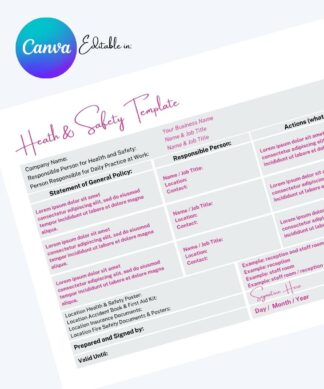 Health and Safety Policy Template – Pink Swirl (Canva Template) Editable£0.99
Health and Safety Policy Template – Pink Swirl (Canva Template) Editable£0.99 -
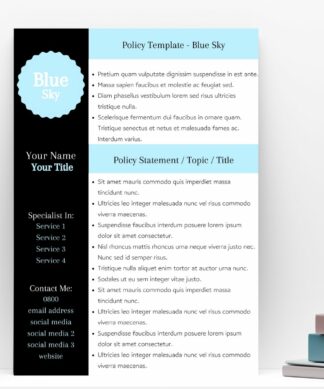 General Policy Template – Blue Sky (Canva Template) Editable£2.99
General Policy Template – Blue Sky (Canva Template) Editable£2.99 -
 General Policy Template – Pink Swirl (Canva Template) Editable£2.99
General Policy Template – Pink Swirl (Canva Template) Editable£2.99 -
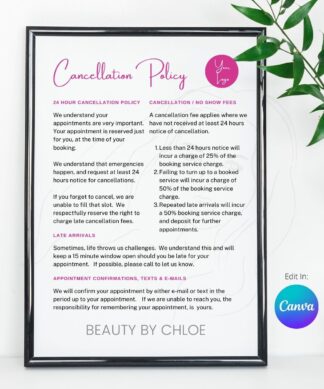 Cancellation Policy (Canva Template) Editable£2.99
Cancellation Policy (Canva Template) Editable£2.99 -
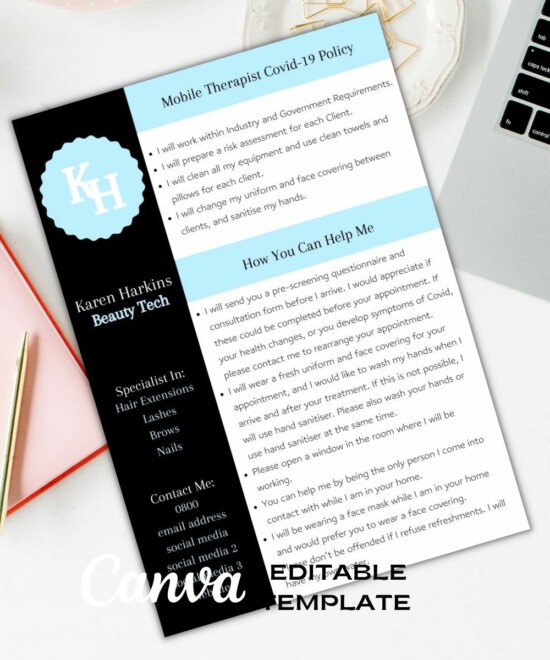 Mobile Therapist Covid-19 Policy (Canva Template) Editable£0.00
Mobile Therapist Covid-19 Policy (Canva Template) Editable£0.00